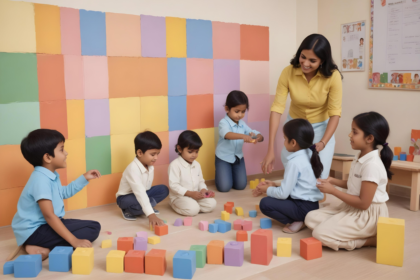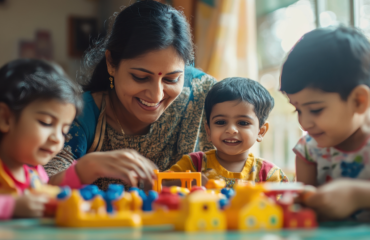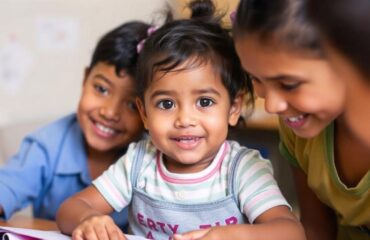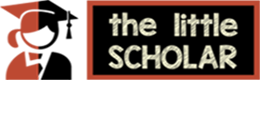
Have you ever wondered what the importance of preschool education is? The truth is that a play school offers more than just games and interactive programs. It is the beginning of our children’s educational and developmental journey, laying the strong foundation for their success in the future.
We all want the best for our children as parents. We want kids to flourish, have self-assurance, and enjoy education. The first step in achieving that is attending preschool. Now, let’s explore the world of preschool education and learn why this is one of the most crucial choices we will ever have to make for the future of our kids.
Importance of Preschool Education and Early Childhood Education
A child’s future can be effectively invested in preschool education. It establishes a solid foundation for their general growth and positions them for success in the classroom and beyond. The following factors explain the importance of preschool and early childhood education.
- Cognitive Development: Preschoolers learn about letters, numbers, and fundamental ideas to prepare for reading and math. Children can also learn how to solve difficulties by participating in plays and other activities. They start to analyze problems and think creatively.
- Social and Emotional Development: Children can engage in peer interaction in preschool. It teaches kids how to work together, share, and settle disputes with their classmates. Learning to recognize and communicate their feelings helps preschoolers develop empathy and understanding.
- Language and Literacy Development: Children are exposed to new words and concepts at the preschool. It enhances their language skills. Moreover, preschoolers learn to express themselves clearly and effectively.
- Physical Development and Health: Healthy lifestyle choices, such as diet and exercise, are frequently emphasized in preschools. Running, leaping, and drawing are exercises that promote the development of physical coordination.
- Future Success: A happy preschool education fosters a lifetime love of learning. Children attending preschool are accustomed to an organized learning environment, facilitating their transition to kindergarten.
Also Read: Making Unforgettable Memories: Fun Blue Day Activity for Preschool
Preschool Curriculum and Teaching Methods
The curriculum and teaching methods used in preschool are intended to support young children’s complete development. The goal is to provide a supportive atmosphere where kids can explore, learn new skills, and develop independently.
Our preschool curriculum at Little Scholar consists of the following essential elements:
- Cognitive development is accomplished by imparting fundamental ideas such as letters, numbers, forms, and colors, as well as problem-solving via play and investigation.
- Interactions and activities in groups accomplish social and emotional development; sharing, cooperation, empathy, and self-regulation are encouraged.
- Language development: Expanding vocabulary, improving listening skills, and developing communication abilities through storytelling, songs, and conversations.
- Physical development: Promoting gross and fine motor skills through physical activities, art, and sensory play.
- Creative development: Nurturing imagination, creativity, and self-expression through music, art, drama, and imaginative play.
Popular Preschool Teaching Methods at Little Scholar:
- Play-based Learning: This method strongly emphasizes education via play, letting kids explore their surroundings and pick up vital skills.
- Montessori Method: This approach uses specially made materials and emphasizes freedom, experiential learning, and self-directed discovery.
- Circle Time: Getting kids together for conversations, music, and stories to foster language development and social connection.
- Sensory Education: Playing with water, sand, and other textures is known as sensory play, and it helps kids develop their senses.
- Art & crafts: Using a variety of art projects to foster creativity and fine motor skills.
- Outdoor Activities: Playing outside encourages social contact, physical activity, and natural world investigation.
- Field trips: Offering opportunities to learn about the community and expand children’s horizons.
Difference between Preschool and Daycare
Although daycare and preschool both offer care for young children, there is a subtle difference between the two:
Preschool:
- Focus: Preparation for kindergarten education.
- Curriculum: Well-organized educational curriculum focusing on students’ social, emotional, and cognitive growth.
- Age Range: children aged from 2 to 5.
- Schedule: Usually adheres to a conventional school year calendar with predetermined hours.
Daycare:
- Emphasis: Supervising and taking care of kids.
- Activities: A combination of unstructured and supervised play focusing on interpersonal communication.
- Age range: May include infants and kids in school.
- Schedule: It usually offers extended hours and flexibility to accommodate working parents.
The contribution and importance of preschool education for children are uncountable. It’s an effective tool for forming young brains and preparing kids for long-term success.
FAQs:
Why is preschool important?
A preschool is important because it is the first place a child begins their learning process through various traditional and unconventional methods.
What is the main objective of preschool education?
The main objective of preschool education is preparing a child for kindergarten. As a result, a preschool provides primary education to children, helping them with their cognitive, physical, and emotional development.
What is the main purpose of early childhood education?
Early childhood education helps children build a strong foundation for their future endeavors by helping them develop physically, emotionally, and cognitively.





